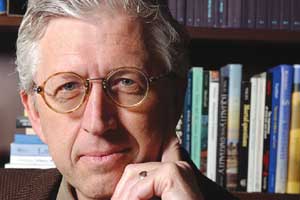Pippin to ask in Ryerson Lecture: What does it mean to live a free life?
By Seth SandersNews Office
 Robert Pippin |
Robert Pippin will ask why, in a world that offers so many alternatives, people still seem so unsure of what they want.
Pippin, the Raymond W. and Martha Hilpert Gruner Distinguished Service Professor in the Committee on Social Thought, Philosophy and the College, will deliver the Nora and Edward Ryerson Lecture, titled “Bourgeois Philosophy? On the Problem of Leading a Free Life.”
The lecture will be held at 5:30 p.m. Thursday, April 8, in the Max Palevsky Cinema in Ida Noyes Hall, 1212 E. 59th St.
Pippin, whose studies of classic German Idealist philosophers such as Kant and Nietzsche have challenged accepted views of modernity and its problems, will address the question of why neither the modern American Dream nor its critics seem to be able to answer nagging fundamental questions.
Pippin pointed out that in an age when old, accepted views about God and the unquestioned authority of rulers have either been abandoned or are being revived in their most archaic forms, a deep anxiety persists about what a good way of life is. In art, the once-scathing critiques of bohemians and avant-gardists may now seem as crusty and traditional as a quilting bee: how many rewrites, Pippin asked, “of what is essentially 19th-century French bourgeois self-hatred are possible in the novel?”
Public culture may offer little better: “It’s ironic,” he said, “that we don’t have a settled consensus on what we regularly insist is most important: Freedom is what we fight wars for, worry about when it comes to our kids, enact complex foreign policies to ensure. But it’s not clear to me that we have the faintest idea of what it is to live a free life. Once the hold of tradition is broken, how do we get back to a form of life, not just a free-floating skepticism?”
Pippin will explore an answer to this unsettling question from the perhaps unexpected direction of Hegel, who proposed that “true freedom is never individual, but social, only possible as part of a community and a culture.”
A faculty member at the University since 1992, Pippin focuses his work on modern German philosophy and has written several books on the topic, such as Kant’s Theory of Form and Modernity as a Philosophical Problem.
Underlying this work is what he described as the problem of “how to understand what’s happened to us since the 16th century.” He explained his interest in German philosophy as connected to its effort “to understand European modernization. These attempts reflect an anxiety about the nature of the modern tradition and the attempt to create a secular foundation for modern ethical life.”
For Pippin, many prominent recent intellectual currents appear as replays of older concerns. In the introduction to the second edition of his Modernism as a Philosophical Problem, he writes that the suspicion of the Enlightenment and the West—typical of new historicism, and cultural and postcolonial studies—is “a phenomenon that should be understood as largely repetitive. A culture of melancholy, profound skepticism and intense self-criticism had become official high culture and the dominant academic one in the European West.”
Pippin said this culture has begun to repeat itself “in new forms, forms now hostile, paradoxically, even to the ideas of high culture, criticism, skepticism or enlightenment” on which it depended.
Modernism as a Philosophical Problem, he explained, reflects his view that “we don’t yet understand what happened to us” during the Enlightenment. “There’s no reason to think that the accounts of the Enlightenment that have settled in are right.” Therefore, his goal was “to re-narrate how it happened, because the positions currently warring don’t represent the actual options or reflect the transition to modernity well.”
Pippin received a Mellon Distinguished Achievement Award in 2001; his lecture flows out of work supported by this award.
Two other projects related to the award are: The Erotic Nietzsche: Philosophers Without Philosophy, which will detail how Nietzsche’s misgivings about modern secular democratic society connect to the nature of human desire; and a book titled Modern Aesthetics After the Beautiful, which will focus on the shift from the criterion or category of beautiful to that of the sublime and the conceptual in late 19th- and early 20th-century art.
Disabled persons who wish to attend the lecture may request assistance by contacting Jen Horslev at 773-702-8369.
![[Chronicle]](/images/sidebar_header_oct06.gif)